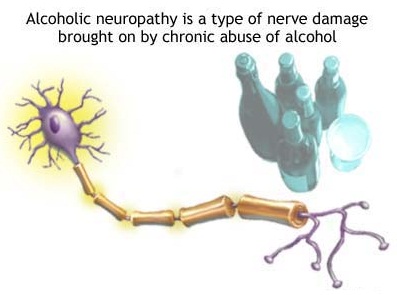
Alcoholic neuropathy is a disorder that affects up to 65% of people who have been drinking alcohol for long periods of time. Although it can also affect people who drink heavily for shorter periods, it is more common among those who have a long history (more than ten years) of alcohol consumption.
What Are the Symptoms of Alcoholic Neuropathy?
Peripheral nerves are responsible for body movements and sensation. When you have alcoholic neuropathy, your peripheral nerves are affected and symptoms may range from mild discomfort to severe disability. It is not life threatening, but it can reduce the quality of your life. These symptoms include:
- Limbs–numbness, tingling, burning, or prickly sensation, muscle cramps, weakness, thinning and loss of muscle function, movement disorders
- Urinary incontinence, problems with urinating
- Bowel incontinence, constipation, diarrhea
- Sexual dysfunction or impotence
- Difficulty swallowing
- Impaired speech
- Nausea and vomiting
- Heat intolerance
- Dizziness/ lightheadedness
Call your doctor if you experience any of these symptoms for proper diagnosis and treatment.
What Causes Alcoholic Neuropathy?
It is not clear what causesalcoholic neuropathy, but experts believe that alcohol may exert direct toxic effects on the peripheral nerves. It can also indirectly affect them through poor nutrition, which is often associated with chronic alcoholism. Severe cases may also manifest as abnormal regulation of internal functions, which are controlled by the autonomic nerves.
Your risk of developing alcoholic neuropathy increases with chronic heavy alcohol consumption or alcohol use for at least ten years.
What Are the Treatments for Alcoholic Neuropathy?
Depending on the degree of nerve involvement, some treatments can help reduce your symptoms and prevent permanent complications from happening.
1. Vitamin Supplementation
Many chronic alcoholicstend to have poor diets. To treat vitamin deficiencies associated with chronic alcoholism, doctors may recommend taking medications and vitamin supplements such as folic acid, biotin, vitamin A, B-vitamins (thiamine, niacin, pantothenic acid, pyridoxine, cobalamin) and vitamin E. These must be taken in addition to a healthy, balanced diet.
2. Pain Control Medications
Nerve pain is a common problem in patients who have alcoholic neuropathy. To relieve chronic nerve pain associated with alcoholic neuropathy, your doctor may prescribe pain relievers and anti-seizure medications such as Gabapentin (Neurontin), Carbamazepine (Tegretol), Pregabalin (Lyrica), Phenytoin (Dilantin), and Topiramate (Topamax). If these are not enough to control severe pain, opiates may be prescribed. However, these drugs can cause physical dependence and addiction. Other options to control nerve pain include the use of antidepressants like amitriptyline (Elavil), duloxetine (Cymbalta), and nortriptyline (Pamelor).
3. Take Therapies
Muscle weakness, lack of sensation and impaired coordination can make it difficult for you to do daily activities. To improve muscle function, your doctor may recommend some therapies, such as physical and occupational therapy.
|
Physical Therapy |
Occupational Therapy |
|
People with alcoholic neuropathy may be advised to undergo a comprehensive program of physical therapy, which may include:
|
The rehabilitation process of people who are suffering from alcoholic neuropathy also involves occupational therapy, which can help the patient maximize his function in daily life. These include:
|
Treating Other Accompanied Symptoms of Alcoholic Neuropathy
1. Dizziness and Lightheadedness
Dizziness and lightheadedness may occur when you are standing up. The condition may need several kinds of treatments before determining which one can successfully reduce the symptoms, which may include wearing compression stockings, increasing intake of salt and sleeping with your head elevated. Using medications can also treat the condition.
2. Bladder Problems
Bladder problems are treated with intermittent catheterization as well as manual expression of urine. Medications can also be prescribed to treat any bladder problems.
3. Injuries
People with alcoholic neuropathy should protect body parts with reduced sensation from any kind of injury. To protect the body, you have to check the temperature of water before bathing to avoid burns. Changing footwear and inspecting the shoes to lessen the risk of injury from pressure is also recommended. Likewise, guard the extremities to avoid injury from pressure.
4. Other Medical Conditions
Several medical conditions like diarrhea, constipation and impotence are treated when needed. These symptoms do not respond very well to treatment in patients suffering from alcoholic neuropathy though.
Are There Any Complications of Alcoholic Neuropathy?
If untreated, serious complications may arise from alcoholic neuropathy. Some of these can be life-threatening. These include:
- Impaired coordination, which can increase one’s risk for accidents such as falls
- Various physical disabilities, which can limit one’s ability to do daily activities
- Permanent damage to nerves
- Loss of sensation
- Chronic pain or permanent pain
- Progressive dementia, which may become irreversible
If you have these symptoms and have been consuming alcohol for long periods or drinking heavily, it is important for you to seek immediate medical help before these complications occur.